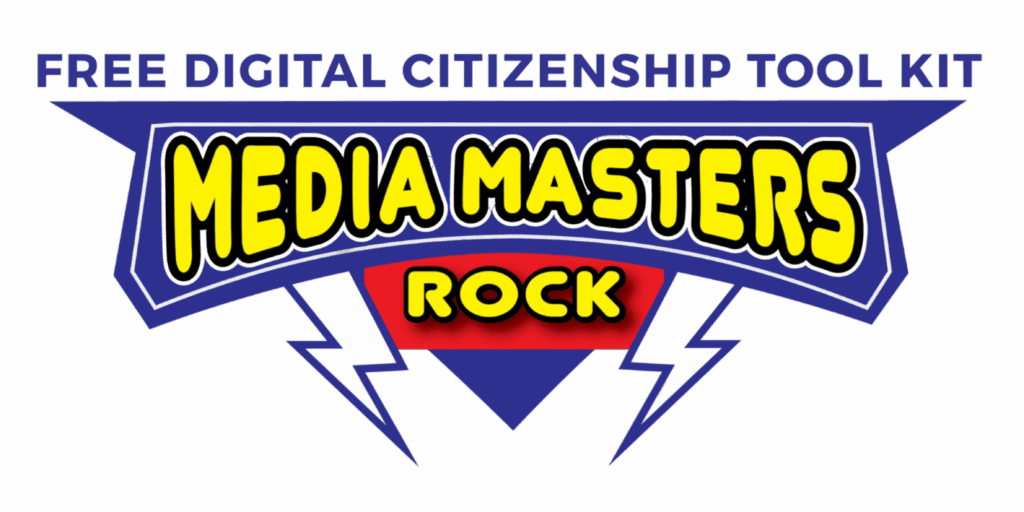What you’ll find on this page…
VOCABULARY WORDS FOR YOUNGER STUDENTS (GRADES K-3)
VOCABULARY WORDS FOR OLDER STUDENTS (GRADES 4-6)
VOCABULARY WORDS FOR MIDDLE SCHOOL STUDENTS (GRADES 7-8)
Strong digital citizenship starts with strong vocabulary. These grade-banded word lists (K–2, 3–6, 7–8) introduce key terms students must know to think critically, spot truth, and navigate the online world safely. Perfect for library instruction, classroom mini-lessons, or quick reinforcement after each video.
Vocabulary Words for (Grades K–3)
Candy – the reward someone gets from posting (like money, popularity, or fame)
Critical Thinking – means stopping to think carefully, then checking to see if something makes sense and is supported by good evidence.
Emotion – a strong feeling (like happy, sad, angry, sadness, anger, or excitement)
Evidence – proof that something is true or false
False – not real or not right
Fame – being well-known by many people
Helpful – kind or useful to others
Hurtful – something that can make someone feel bad
Question – something we ask to learn more
Media Master – A person who thinks before acting online
Media Master Move – smart habit that helps people make better choices online.
Motivation – the reason someone does something
Post – something someone puts on the internet like a photo, message, or video
Popularity – being liked by many people
Question – something we ask to learn or understand more
React – to do something quickly because of a feeling
Skeptical – being unsure until we know more
Thinking Trap – A mistake people make when they believe or share something without checking it first.
True – real and correct
Valid – real or important (as in, “Your feelings are valid”)
Vocabulary Words for (Grades 4–6)
AQBS RULE – a rule that reminds us to Ask Questions and Be Skeptical before reacting to social media.
Attention Economy – the idea that online attention (views, likes, clicks) has value
Bad Candy – social media posts that make the internet worse, such as lies, mean or cruel posts.
Bias – a one-sided or unfair perspective that may be unaware of
Candy – a reward someone gets from a social media post, like money, fame, or popularity.
Civility – treating others with politeness and respect, even when you disagree with them.
Clickbait – attention-grabbing content designed to encourage clicks, not always honesty
Credible – able to be believed or trusted
Credibility – how believable or trustworthy something is
Emotion Detectives – someone who asks themselves why they are having a strong emotional response to a social media post.
Confirmation bias – favoring information that confirms what you already believe
Critical Thinking – means stopping to think carefully, then checking to see if something makes sense and is supported by good evidence.
Digital Citizen – someone who uses technology in safe, respectful, and responsible ways
Evaluate – to judge or determine the value of something
Emotional Trigger – content designed to provoke a strong feeling
Evidence – facts, data, or examples that support a claim
Fame – being known by many people
Fact vs. opinion – distinguishing what’s provable from what’s personal
Helpful – meant to assist or benefit others
Hurtful – unkind or harmful to others
Influencer – someone who gains money, fame (status), or popularity (followers) from online posts
Manipulate – to unfairly influence emotions or thoughts
Manipulate – to influence someone’s emotions unfairly
Manipulation – controlling or influencing someone unfairly
Media Master – A person who pauses to think before acting online
Media Master Move – smart habit that helps people make better choices online.
Monetization – making money from views, likes, or online traffic
Motivation – the reason someone does something
Persuade – to convince someone to think or do something
Post – something shared online (a message, image, or video)
Popularity – being liked or followed
Reaction vs. Response – impulsive vs. thoughtful choices
React – to respond immediately and emotionally
Respond – to pause, think, and reply with care
Source – the origin of a message or post
Skepticism – questioning or doubting rather than accepting at face value
Strong Evidence – Evidence – multiple credible sources, reputable outlets, consistent data
Thinking Trap – a mistake people make when they believe or share something without checking it first.
Weak Evidence – screenshots, rumors, single accounts, AI-generated visuals
Vocabulary Words for (Grades 7–8)
Algorithm – A set of rules used by apps and platforms to decide what content you see first.
Anchoring Bias – A thinking mistake where the first thing you see or hear influences all your later judgments.
Confirmation Bias – The tendency to favor information that supports what you already believe.
Cognitive Bias – A built-in thinking shortcut that can lead you to make wrong assumptions or bad decisions online.
Critical Thinking – Carefully examining information to decide whether it makes sense and is supported by strong evidence.
Credible Source – A trustworthy, reliable place to get information — like a known news organization, school website, or science source.
Digital Footprint – The record of everything you do online, including posts, comments, likes, and deleted content.
Digital Manipulation – Using tools like AI, filters, or editing software to change or distort reality.
Disinformation – False information spread on purpose to trick, mislead, or manipulate people.
Misinformation – Incorrect information that is shared by someone who believes it’s true.
Emotional Trigger – Content designed to provoke a strong reaction — like fear, anger, or excitement — so you’ll click or share quickly.
Evaluate – To analyze something carefully and decide whether it’s truthful, useful, or reliable.
Evidence (Strong vs. Weak)
- Strong Evidence: multiple credible sources, consistent data, facts supported by experts.
- Weak Evidence: screenshots, rumors, viral posts, AI-generated visuals, single unverified claims.
Heuristic – A mental shortcut your brain uses to make quick decisions — helpful sometimes, but can lead to mistakes online.
Influencer Economy – An online system where people earn money, fame, or popularity through followers, likes, and engagement.
Motivation – The real reason someone posts something — money, attention, influence, or to be helpful.
Manipulation Tactic – A strategy used to change your emotions, opinions, or actions without you noticing (clickbait, fear, outrage).
Media Master – A person who THINKS FIRST online — using skepticism, evidence, and responsible behavior before acting.
Media Master Move – A smart habit used to avoid thinking traps — like checking sources, reading past the headline, or pausing before reacting.
Monetization – Turning views, clicks, or engagement into money.
Online Credibility Test – The process of checking sources, cross-checking facts, and looking for supporting evidence.
Persuasive Technique – A method used to convince you of something — emotional appeal, popularity, fear, or celebrity endorsement.
Reaction vs. Response
- Reaction: quick, emotional action.
- Response: thoughtful, calm, and informed action.
Skepticism – A healthy habit of questioning information instead of believing it immediately.
Strawman Argument – A fallacy where someone twists another person’s words to make them easier to attack.
Thinking Trap – A mental mistake that leads you to believe or share something without checking it first.
Viral Mechanism – The way content spreads quickly because of emotional triggers or algorithm boosts.
Motivation Analysis – Examining who benefits from a post and what “candy” (money, fame, popularity) they gain.
Digital Responsibility – Using online tools safely, respectfully, and with awareness of how your actions affect others.
Truth Test – A set of questions to decide if a post is real: Who made it? Where’s the proof? Why does it exist?
The Media Masters Pledge
I promise to take responsibility for my words and actions online and offline.
Here’s your quick link to all the Media Masters Rock videos on YouTube!
Got a few minutes left in the day? Press play and wrap up with something smart, fun, and meaningful!

